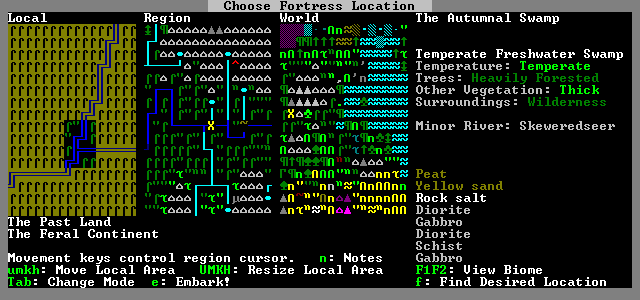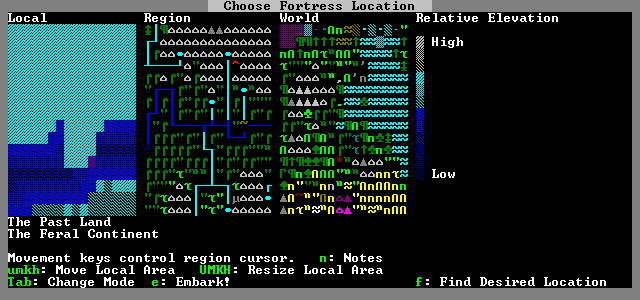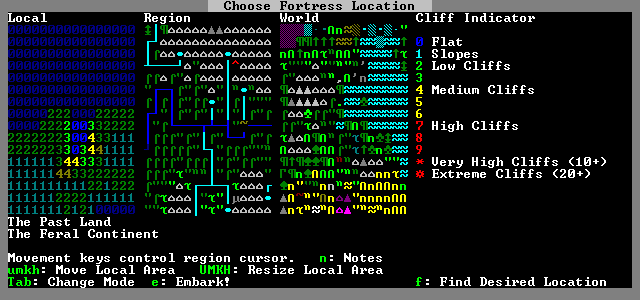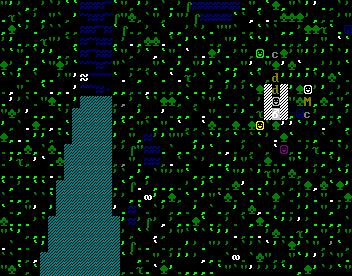- v50 information can now be added to pages in the main namespace. v0.47 information can still be found in the DF2014 namespace. See here for more details on the new versioning policy.
- Use this page to report any issues related to the migration.
Waterfall
v53.10 · v0.47.05 This article is about the current version of DF.Note that some content may still need to be updated. |
A waterfall is any natural or engineered feature where water falls through open space for one or more z-levels. Natural waterfalls occur on rivers traveling over cliffs or other hilly terrain. Engineered waterfalls can be constructed from any reliable water source, though reservoirs, rivers, and aquifers are most common.
Benefits of waterfalls[edit]
- Waterfalls generate mist, which gives dwarves happy thoughts.
- Waterfalls will clean contaminants from your dwarves, which may save the fortress from a plague someday.
- Natural waterfalls can provide a ready source of fish for your fortress. Construct floor grates under the falls to catch falling creatures and fish will literally arrive at your doorstep, already dead and ready to prepare. The downside is that there may be some blood splatters upon arrival. (Constructing the floor grates may require you to repeatedly un-suspend construction, as the dwarves will repeatedly complain about the site being submerged.)
Drawbacks of waterfalls[edit]
- Waterfalls will impact your framerate. You can mitigate this somewhat (at the cost of micromanagement or complexity) by only operating your waterfall occasionally (which is much easier with engineered waterfalls).
- Waterfalls can also have interesting effects on water pressure. Depending on what you are trying to do, this may actually count as a benefit.
- Freezing waterfalls are deadly to any dwarves unfortunate enough to end up in a block of ice. They also tend to deconstruct nearby constructions when freezing.
- In some cases, the water at the top of an artificial waterfall can have low depth, causing dwarves to attempt to cross it, falling to the bottom of the waterfall.
Locating a natural waterfall[edit]
While the site finder does not include waterfalls, the embark screen can still be used with fair accuracy to locate waterfalls for your fortress. Press Tab until you reach the relative height and cliff indicator screens, and follow rivers. Waterfalls are often located where two rivers intersect and the smaller river empties into the larger one. Some particularly tangled segments of rivers can result in maps with two or more waterfalls. Here, an example of a stream flowing into a minor river is shown.

In most regions, the relative height of rivers will be the same. This is generally the darkest color, to indicate the lowest point. However, there are places where the relative heights along rivers will change. This is a good hint as to the presence of a waterfall. Generally, the greater the difference in color, the more impressive the waterfall will be. This is of course only a relative measure: the same difference in color implies wildly greater levels of scenic grandeur in mountains than it does in flatlands. The largest waterfalls are found where streams drop into major rivers near the mountains.

The cliff indicator tool can be used to further confirm the presence of waterfalls, and to fine tune your embark area. In this example, the embark area straddles the tiles labeled as having cliffs with a height of four. The "flat" tiles labeled as dark blue zeroes are the southern extension of the stream: for the purposes of the site finder, all segments of the stream are on the same height, including the cliff at the end. The exact location of the waterfall will be in the zero sandwiched between the fours. You can use this knowledge to fine-tune your embark area to your favorite size. In this case, a 3x3 map could be centered on the bottom zero tile, and a fortress built around the majestic centerpiece.

Here is the end result of the example waterfall search: seven dwarves milling around in the dirt, and the stream Bristleditches the Messianic Vomit falling five z-levels as it spills into the minor river Skeweredseer, a teeming source of alligators, longnose gar, and carp.

Generating natural waterfalls[edit]
When it comes to creating breathtaking waterfalls, advanced world generation is really handy. All you need to do is make a difference in elevation. Here are some tips:
- Choose your world's dimensions.
- Adjust the elevation mesh, the mesh size is generally proportional to the world size.
- Increase the elevation mesh range of 20-40 or 60-80.
- Increase minimum river start locations if you want. Make it 600 or 800.
- Adjust the drainage mesh if you want major rivers with waterfalls (something like 100:100:100:100:1) works well
Follow rivers from their head to mouth, turn on the elevation map periodically, and where the river crosses a major elevation (usually where it meets another river) you'll see those 20, 37, 50 or even more levels tall waterfalls.
Building an artificial waterfall[edit]
By creating a stream of falling water with screw pumps or making use of a river or brook on a high z-level, you can engineer a waterfall to take advantage of the happiness it causes. Such waterfalls can become highly complex indeed.
Artificial waterfalls make excellent happiness generators, and are best placed in populated or well-trafficked areas like dining rooms and main hallways. For added effect, the area surrounding the waterfall can be designated a meeting hall zone.
If your map has a cavern that you feel confident building in, consider building a sewage system that runs into the cavern and off the edge of the map. This way you can simply build a channel from a river to a specific area within your fortress and then have the water pour into the drain. If you are feeling creative, create running water outlets across your fortress, all which run into your sewer system.
Note that too much water coming down at once can blast your poor dwarves like a fire hose, throwing them into obstacles and injuring them, so careful tuning of the output is sometimes required - the flow can be slowed down by building walls that force it to flow between corners. An alternative is to have the waterfall under the floor, with the mist filtering up through floor grates or bars, since the mist itself is what causes happy thoughts.
Always have some way to halt the inflow, such as a bridge or floodgates operated by a lever. An oversight in your design that is flooding your fortress is all but impossible for your dwarves to fix if gushing water keeps blasting them away from it.
Design example[edit]
Three z-levels are necessary to do this. On the bottom is the reservoir of water. The middle layer is the screw pump and the "meeting hall" where dwarves will gather to enjoy the mist. On top is a narrow corridor that connects the pump chamber to the hole through the ceiling of the meeting hall. Under this hole is a grate that connects to the reservoir and prevents dwarves from falling in and drowning.
The pump pulls water out of the reservoir and pushes it up above the meeting hall. The water falls down through the grate, back into the reservoir.
A more complicated dwarven waterfall can be seen here at DFMA in movie form. A mistake to note: Water is hitting the side of the bridges, which splashes the water around and can knock dwarves in.
"Waterfall" in other Languages
|
Worlds | |||||||||
|---|---|---|---|---|---|---|---|---|---|
| General | |||||||||
| Map |
| ||||||||
| Civilization |
| ||||||||


